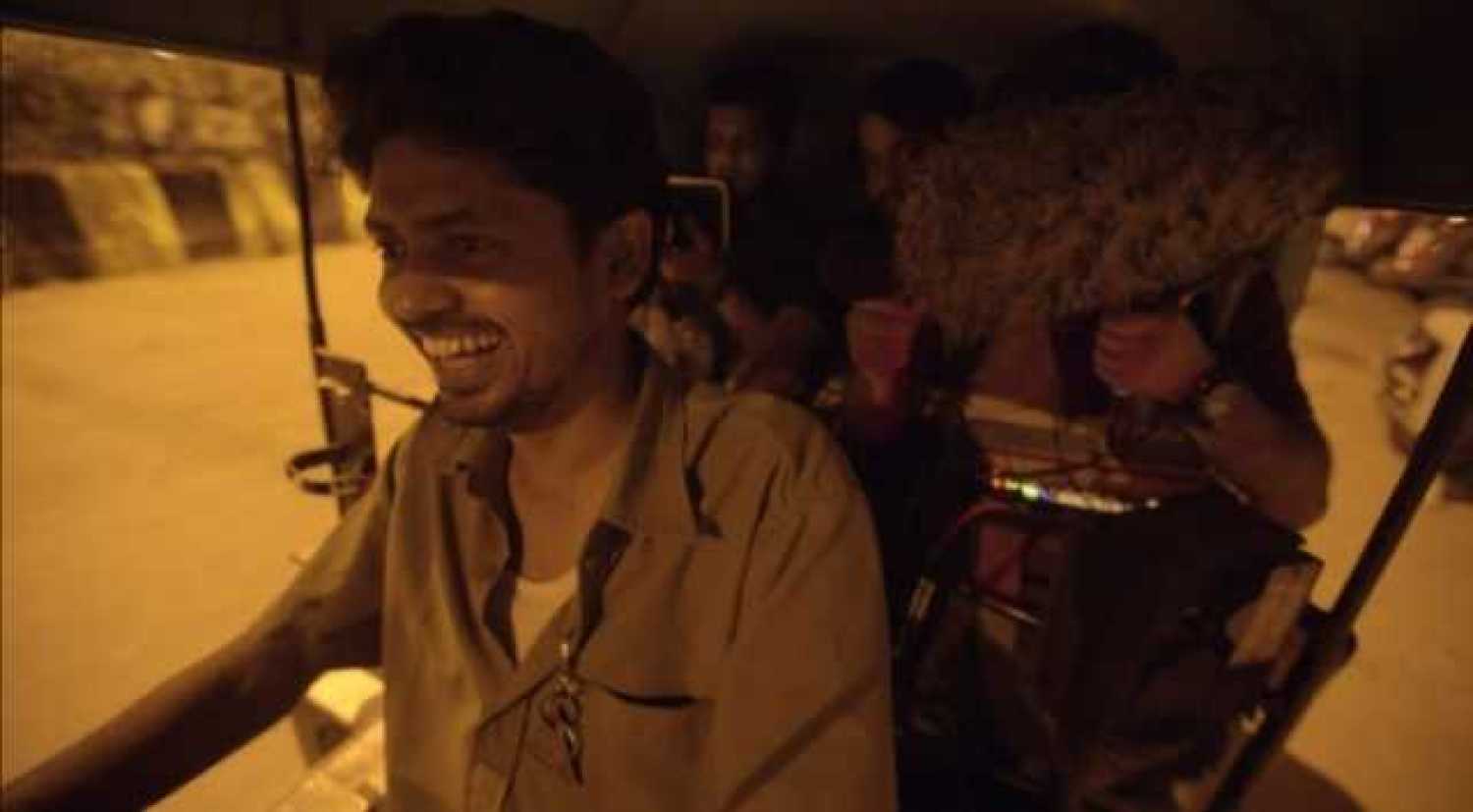You can't miss first-time director Rohit Mittal’s psychological crime thriller, purely for the dark and brilliant performance of rookie actor Deepak Sampat.


Mayur Lookhar
Film: Autohead
Rating: 3.5/5
When a filmmaker makes a film with disdain, there is always the risk of it being perceived as vendetta or propaganda. Rohit Mittal had openly declared his disdain for the voyeuristic, parasitic documentarians who feed off the misery of the meek. So, he creates a perverse monster who lures them into his world before devouring their souls. Mittal’s monster rears its ugly 'Autohead’ in the form of Narayan (Deepak Sampat), a psychotic tuktuk driver from Bihar who loses his bearings in merciless Mumbai.
For Narayan, the only motto in life is to marry Roopa (Ronjini Chakraborty), a sex worker who despises the Bihari autowallah and showers love only on those who shell out the most cash every night. Despite her rejection, Narayan is head over heels in love with Roopa. He repeatedly curses her profession but at the same time derives perverse pleasure in it.
Narayan is a big fan of ‘Bollywood’, in particular Mithun Chakraborty, and has painted Aadmi, the title of a Chakraborty film, on the back of his tuktuk.
Mittal (director), Sunny Banerjee (cameraman), and Ravidev Singh (soundman) decide to make a mockumentary on Narayan. Flattered, Narayan opens up to the three men, allowing them to capture his life 24x7, literally. He reveals his sexual fantasies, his love for cinema and the stars. The mockumentary, however, experiences its first bump when Narayan’s scuffle with an unruly Maharashtrian passenger turns fatal. This does not stop Mittal & Co and they continue filming, in the process capturing more sensational footage.
Psychological crime thrillers are currently in vogue, but never before has one come across such a fearsome, poker-faced character as Narayan. Here is a man who believes he is endorsing prime minister Narenda Modi’s ‘Swachch Bharat’ mission, no less, by wiping out social ills.
Making the switch in front of the camera is unknown art director-turned-actor Deepak Sampat who gets into the skin, mind, and soul of the character. He is the pivot around which Autohead moves, the engine of the film.
Gifted with a poker face, Sampat can turn that smile on your face to fear in a jiffy, and vice versa. For instance, in one sequence, Narayan, like an excitable kid, wants to talk about the Salman Khan starrer Tere Naam (2003) but is flabbergasted when Mittal & Co confess they haven’t seen it. The trio proceeds to correct him that it was Satish Kaushik who directed the film and not Khan. Narayan is all ears, but next moment breaks into a rigid smile before declaring, “Picture Salman ne hi banaya, baat kartey hain. [Nonsense! Salman made the film.]"
It’s hard to pick one memorable scene for Sampat achieves near perfection in most. His dancing like Salman Khan to a Tere Naam track in an inebriated state will sweep you off your feet. His heated arguments in chaste Bhojpuri with his uninvited mother and threatening her with dire consequences are staggering. Intriguingly, Jhanvi Dwivedi wasn’t even aware that the camera was on her when she enacted the mother-son quarrel.
It is perhaps impossible to give such a virtuoso performance without going the distance on and off the screen. A gifted actor, Sampat has mastered the method to this madness. Narayan has shades of Raman but though fine an actor Nawazuddin Siddiqui is, his Raman Raghav 2.0 act pales in comparison to the brutal brilliance of Sampat’s Narayan. Sampat’s performance reignites memories of Robert De Niro’s menace in Martin Scorsese's Taxi Driver (1976). Rohit Mittal has unearthed a gem.
Along with stunning screenplay, the USP of the film lies in the performance of every actor. Like Sampat, Ronjini Chakraborty, too, has done her homework in tapping the persona of a commercial sex worker. Even in brief roles, every other actor, from those who travel in Narayan’s autorickshaw to the police officers with their Maharashtrian swagger and Sampat’s elderly roommate, all have given flawless performances.
Sampat and the actors, though, can’t thank Rohit Mittal enough for providing them with the right tools. To get a diamond, one has to explore deep in the mines. Mittal has clearly explored the dirty streets and ghettos of Mumbai to produce realistic, rustic and unapologetic characters. Ironically, his production is titled Stalker Films.
If Sampat is Autodhead’s engine, Mittal is its fuel. Though a first-time director, he is gifted with a great cinematographic sense. His use of shaky frames to capture a distant shot of Sampat and Roopa’s pivotal conversation is indicative of a trembling lensman who foresees the impending doom.
Mittal’s sensational shoots in Autohead are partly reminiscent of Jake Gyllenhaal’s act in Nightcrawler (2014). Both Lou (Gyllenhaal) and Mittal care two hoots for ethics; for them, all that matters is visually appealing stories.
Autohead ticks all the right boxes, but as with most psychological crime thrillers, it runs the risk of being accused of glorifying crime. Narayan sadistically crushing stray dogs under his wheels is not a pleasant sight. Also, certain key elements of the film have shades of Raman Raghav 2.0. These few failings take a bit of the fuel out of the tank, somewhat reducing its mileage, but it doesn’t put the brakes on Autohead’s ride.
The monster has found a new vehicle. Hell never arrived on three wheels until Rohit Mittal put his Autohead on the road. Beware folks, don’t be rude to your autowallah next time.
Director: Rohit Mittal
Cast: Deepak Sampat, Ronjini Chakraborty, Rohit Mittal
Runtime: 97 minutes
